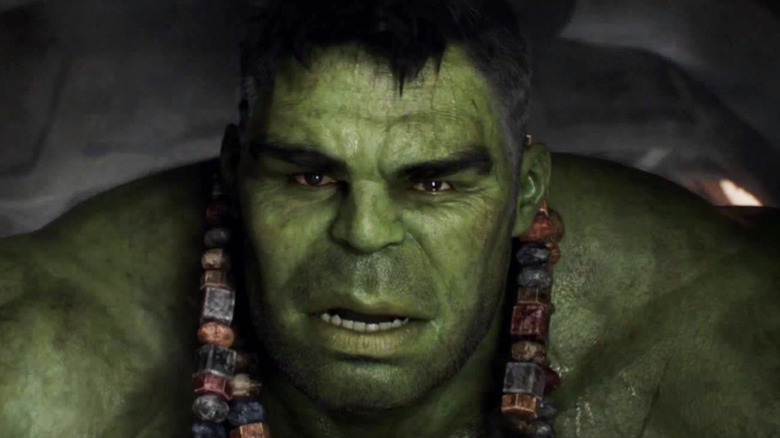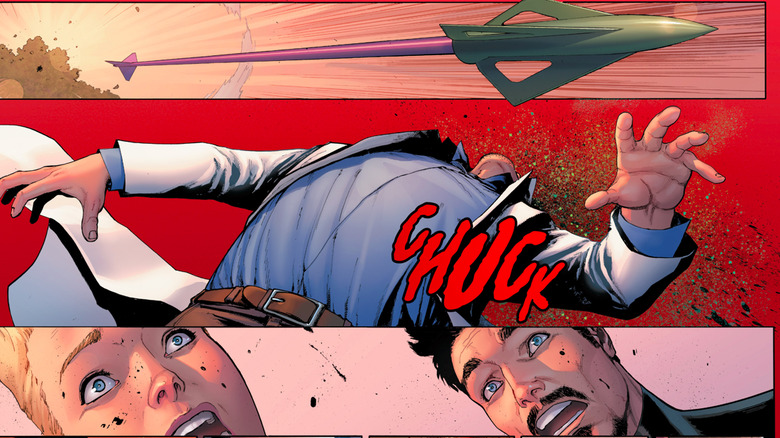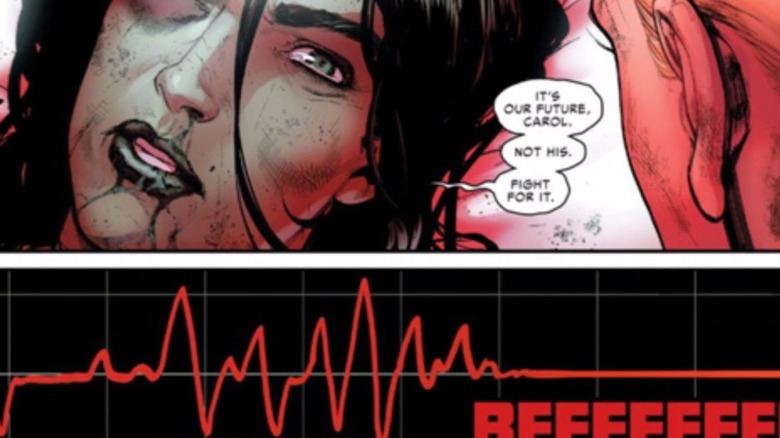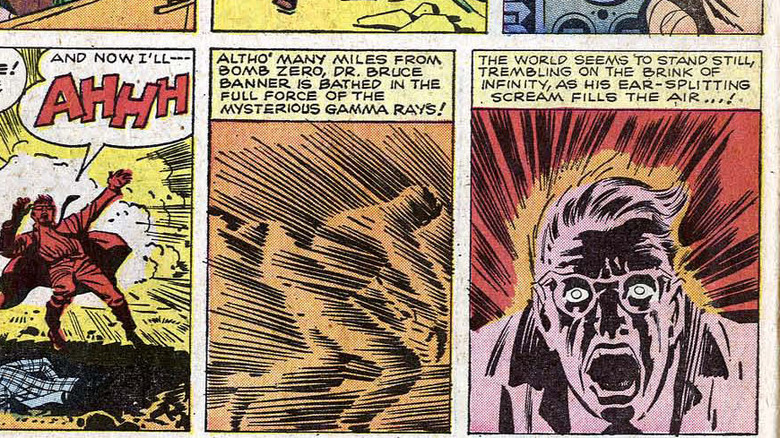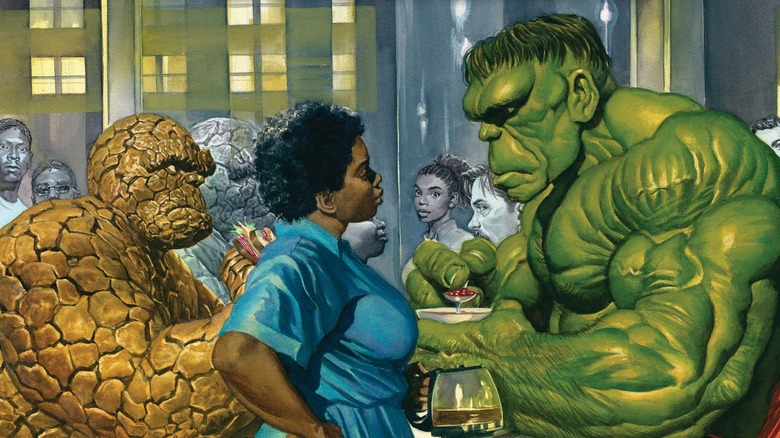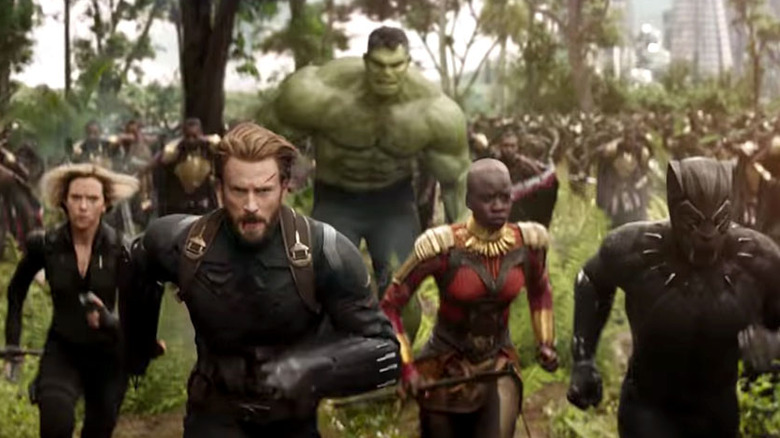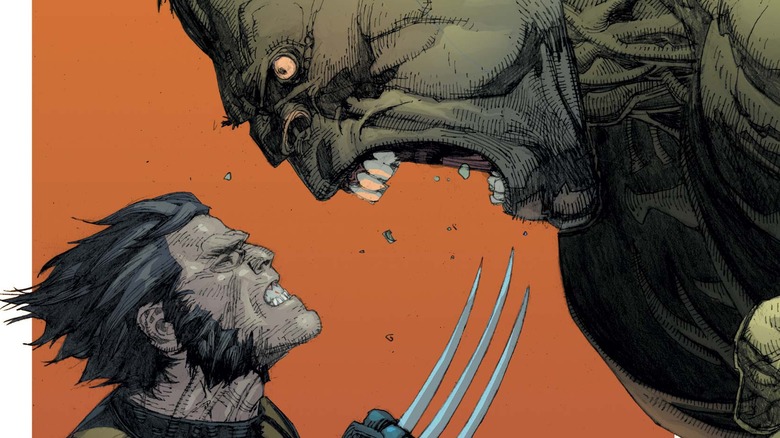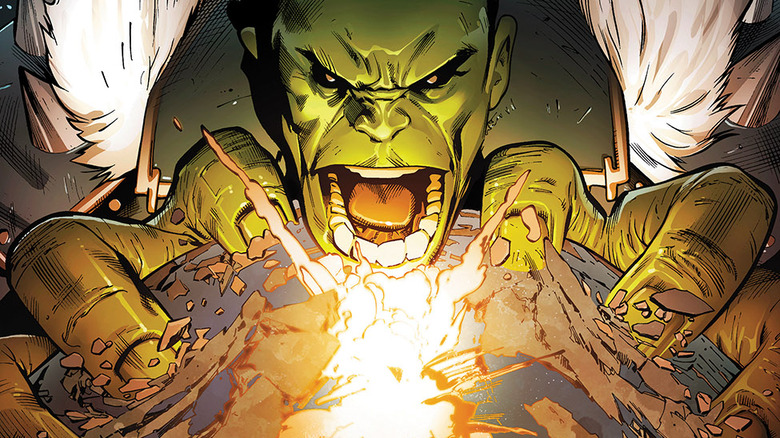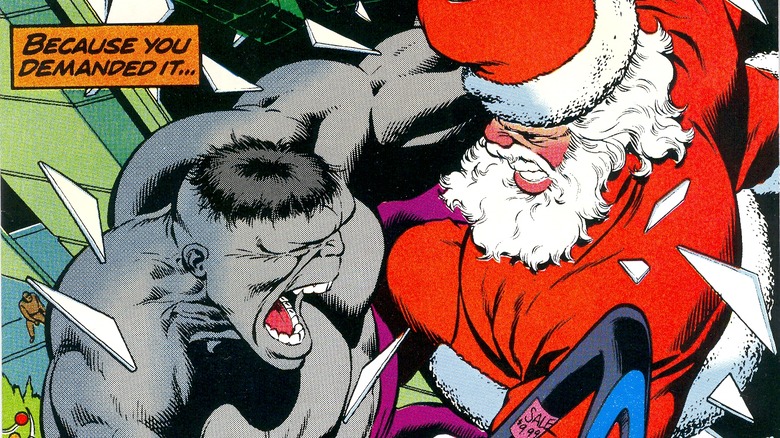Ways Marvel Lied To You About Hulk
Right on the front cover of "The Incredible Hulk" #1, the then-gray-hued behemoth is introduced as "The Strangest Man Of All Time." Back in 1962, that was a pretty dubious designation to bestow upon Dr. Bruce Banner's monstrous split personality — Marvel spent that decade pumping out super-weirdo after super-weirdo, after all. But nowadays, it is indeed obvious that the Hulk is a uniquely strange denizen of the Marvel Comics universe.
Ever since that fateful experimental bomb test drenched Dr. Banner's puny human body in gamma radiation, the Hulk's emotional disposition, intellect, and sometimes even his skin tone have drastically shifted at least once or twice per decade. Even if we forget about the inevitably wacky comic book timeline and focus on the Marvel Cinematic Universe (MCU) exclusively, we've seen the Hulk as a rage monster with a child's intellect, a confident intergalactic gladiator, and finally, an intelligent Hulk-Banner hybrid who could be the strongest and smartest there is.
Bruce Banner doesn't put on a costume to become the Hulk: He changes into the Hulk. Changing is what the Hulk does. So how is Marvel supposed to lie about a character when one of that character's defining qualities is inconsistency, you may ask? It doesn't happen often, but every now and again, Marvel finds a way. These are the wild, weird, and just plain wacky ways Marvel has lied to you about the Hulk.
Marvel says the Hulk is immortal, even though he's died multiple times
Superhero characters dying and coming back to life is an omnipresent genre trope. It's gone on so long, in fact, that fans complaining about superheroes dying and coming back has become a trope of its own. Superman flies faster than the speed of sound and shoots heat rays out of his eyes, and we don't ask questions. But if he demonstrates some resistance to human mortality, that's the line of plausibility DC isn't allowed to cross, according to our arbitrary whimsy.
The overlords of our imaginations at Marvel have sought to rectify this problem by making several prominent Marvel heroes functionally immortal, including the Hulk. But the Hulk has definitely, actually died on multiple occasions. 2018's "Avengers" #684 helpfully documents at least six deaths of the Hulk from which he later returned, as strong as ever.
Clever guy that he is, Dr. Bruce Banner eventually figures out that he keeps bouncing back from fatal injuries because what looks like immunity to death is just as much a part of being the Hulk as super-strength. We should stress the "looks like" part of the prior statement, because technically, Banner isn't immortal. "That's my secret, Captain, " he declares to a hostile team of Avengers in 2018's "The Immortal Hulk" #6, "I'm already dead." Does it work? Sure. Does it mean Marvel lied about his previous deaths? Pretty much.
The Hulk's supporting characters are dead until they're not
Just like every other superhero character with a decades-long history, the Hulk's put together a support network of friends, family, and associates. It includes teenage sidekick Rick Jones, occasional wife Elizabeth "Betty" Ross, sometimes-arch-nemesis and father-in-law General Thaddeus "Thunderbolt" Ross, cousin and fellow superhero Jennifer "She-Hulk" Walters, and a handful of other super-types.
Just like the Hulk himself, these characters have ostensibly died multiple times. Rick Jones goes down in a blaze of glory in 2017's "Secret Empire" #1. Betty Ross has been killed twice: First by gamma radiation poisoning in 1998's "The Incredible Hulk" #466, and then by an assassin's bullet in 2019's "The Immortal Hulk" #14. Thunderbolt Ross is murdered by supervillains attempting to frame Steve Rogers in 2018's "Captain America" #6. She-Hulk is killed by vegetable-based aliens called the Cotati in 2020's "Empyre" #4. Basically, if you're buds with the Hulk, you're marked for at least one trip to the afterlife.
Now, a fast and easy relationship with the great beyond is not unique among known associates of famous superheroes — just ask anyone who's ever fought crime under the codename "Robin." But the fact remains that these folks have bitten the dust, then returned to life, often without much explanation. What is the truth, Marvel?
Bruce Banner didn't survive that gamma bomb explosion after all
Some folks say that 2018's "Immortal Hulk" series retcons the Hulk's origin story, but that's not precisely true. "Immortal Hulk" does not erase or alter events from the Hulk's extensive comic book history — it just re-contextualizes them in a way that makes them seem more plausible. Does that retroactively make everything we knew about the Hulk into something like a lie? Yeah. Is it justified? Pretty much.
When a typical person is exposed to a blast of gamma radiation, they die. So it follows that even though Bruce Banner appears to survive a gamma explosion in "The Incredible Hulk" #1, this is not the case. In the process of pulling Rick Jones out of harm's way, Bruce Banner is covered in gamma and killed almost instantly. Following his death, as is revealed in 2018's "Avengers" #684, he experiences his first of what will be many encounters with the mysterious Green Door before returning to apparent life and continuing on with his business.
For years, "Immortal Hulk" posits, we assumed Bruce Banner is still alive, based on his tendencies to walk, talk, eat, drink, and do science. But these assumptions are incorrect. It's a pretty cool retcon, but it sure does make you wonder who else might be a living-dead gamma mutate, doesn't it?
This Immortal Hulk cover lies about its comic's story
The cover art of individual comic issues often misrepresents the story within. Such is the case with 2021's "Immortal Hulk" #41, though one could persuasively argue that "Immortal Hulk" cover artist Alex Ross captures the spirit of the Thing's unanticipated dinner date with an individual he initially assumes is the Hulk. As readers familiar with the series already know, the Thing visits Wilson's Two-In-One Hot Dogs with Joe Fixit in Bruce Banner's body in this issue. The fully muscle-bound, not-so-jolly green giant slurping down a bowl of soup on the cover does not appear, technically speaking.
Is Ross — or more precisely, Ross and his editors at Marvel Comics — in the right to publish an instantly memorable image at the expense of story accuracy? It's a misleading cover, to be sure, but it's also fantastic. Ross' signature style humanizes this pair of thoroughly monstrous heroes by placing them in a familiar, mundane location. It manages to be lightly humorous without mocking or satirizing its subjects, and is just as brilliantly rendered as Ross' other work.
So it's great, but it's also not entirely honest. But for those of us who remember the '90s, when Marvel regularly slapped Spider-Man and Wolverine on the covers of comics they only appear in a few panels of, this cover's fib feels very forgivable.
The Hulk appears in the Infinity War trailer, but not the actual movie
Marvel Studios added and subtracted all kinds of details in the trailers for 2018's "Avengers: Infinity War," in order to confuse internet sleuths. One shot prominently featured in early "Infinity War" promotional material includes Black Widow, Captain America, the Hulk, Okoye, and Black Panther running alongside each other with the Wakandan army in the background. The shot looks highly purposeful and intense ... and it does not appear in "Avengers: Infinity War." The Hulk doesn't even participate in that fateful battle in Wakanda — Bruce Banner does, but that's a whole 'nother story.
Asked why it's worth going to the trouble of manufacturing superfluous images just to throw off viewer expectations, Joe Russo told Variety, "When you try to predict what an audience wants, you're going to make mush. When you commit to the story you want to tell, it tends to have a much more resonant impact ... The audience can tell you they love chocolate ice cream, but if you give it to them every day, they're going to get sick of it real fast. You've got to stay ahead of them."
So, yeah, this is definitely an instance of Marvel lying about the Hulk. But if this sort of lying lets us be surprised when the story takes off in an unexpected direction, maybe we can all agree to allow it.
Ultimate Wolverine Vs. Hulk was only supposed to take one year to publish, not three
Because a famous name gives a short-term boost to sales, comics publishers will sometimes risk inviting an uninitiated pro from another segment of the entertainment industry to dabble in sequential art. Sometimes, this works out superbly: If Dark Horse Comics hadn't given My Chemical Romance lead singer Gerard Way a chance, "The Umbrella Academy" wouldn't exist. Sometimes, however, it's a disaster: DC giving Kevin Smith the key to the Batmobile resulted in 2009's "Batman: The Widening Gyre," which sees the Dark Knight wet his pants.
As the co-creator of supernatural TV dramas "Lost" and "The Leftovers," Damon Lindelof seems like an obvious choice of celebrity comics writer. But Marvel probably should've waited until "Lost" wrapped production in 2010 to hire him for "Ultimate Wolverine Vs. Hulk," a six-issue miniseries originally planned to hit shelves on a bimonthly basis, starting in late 2005. In the end, however, it took roughly three and a half years for the series to wrap up, with its final issue going on sale in May 2009.
Now, "Ultimate Wolverine Vs. Hulk" isn't the most essential Wolverine or Hulk storyline of all time, so the delays didn't cause widespread reader meltdowns. Lindelof also went on to conjure up HBO's spectacular "Watchmen" miniseries, which more than compensates for his deadline-related transgressions. Still, it counts as a lie — just one we can easily forgive.
Marvel miscounted how many Hulk comics they'd published
Relaunching a decades-old series with a fresh first issue can provide new readers with a handy jumping-on point. A comic book labeled something like "The Impressive Batman" #1 just looks more inviting to the unindoctrinated than the same product advertised as something like "The Impressive Batman" #927. On the other hand, continuing to label monthly floppy comics in a purely authentic order better reflects the characters' longevity and their prominent place in cultural history.
No matter what one prefers, it's clear that the higher the numbers go and the more times a publisher restarts a series with a contemporary "#1," the easier it gets to mix things up. A Bleeding Cool report from 2017 chronicles an embarrassing flub in this department: Marvel briefly promoted "The Incredible Hulk" legacy issue #709 as legacy issue #708. Granted, counting all the monthly Hulk comics printed over the years is a confusing task. As Bleeding Cool points out, the original "Incredible Hulk" series only lasted a handful of issues before low sales prompted its merging with the pre-existing "Tales to Astonish" series. This means that plenty of early Hulk comics don't actually include the word "Hulk" in their title. It's a simple mistake for some poor schmuck at Marvel to have made, but it's still a filthy, filthy lie.
Marvel made it look like the Hulk and Santa were going to throw down
What kind of nutcase wants the Hulk to fight Santa Claus? The Hulk is the living embodiment of fury, wielding more pure physical strength than any other creature on Earth. Santa is a jolly old man who gives presents to good boys and girls. Granted, Santa has a few magical abilities at his disposal, but the Hulk would instantly turn him into a thick smear of candy cane-colored paste. That's why it's a relief that the Hulk does not actually assault Santa in 1991's "The Incredible Hulk" #378. But boy, does its cover make it look like a Yuletide smackdown is imminent.
In this issue, the Hulk encounters the Rhino. The street-level villain is taking a break from his usual mayhem in order to grift a department store under the guise of a Santa-for-hire. Upon Bruce Banner's arrival and transformation, Rhino's night takes a turn for the hurting. Ironically, the fight ends when the battling behemoths realize they're upsetting a small girl whose belief in Santa has been shaken by his apparent attack on a beloved superhero. Rhino and Hulk put their differences aside in order to provide the kids at the department store with a nice Christmas memory.
Letting those kids think Rhino is Santa is itself a lie, of course. But since the truth would traumatize them horribly, we're going to go ahead and say that the Hulk's fib is forgivable.
